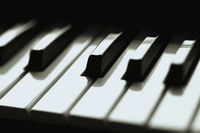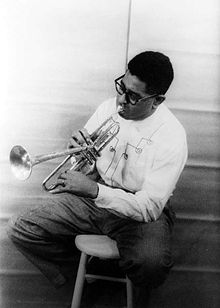Piano Sheets > Dizzy Gillespie Sheet Music > Salt Peanuts (ver. 2) Piano Sheet
Salt Peanuts (ver. 2) by Dizzy Gillespie - Piano Sheets and Free Sheet Music

About the Song
Other avaliable versions of this music sheet: Version 1 Version 2 Version 3
"Salt Peanuts" is a bebop tune composed by Dizzy Gillespie in 1942, credited "with the collaboration of" bebop drummer Kenny Clarke. It is unique in that it has a small sung part in which the singer sings "Salt peanuts, salt peanuts." Most bebop songs have no singing (aside from Scat singing.) Many consider the song a bop jazz standard. Perhaps one of the most famous recordings of this tune is on the Live at the Massey Hall, Toronto, 1953 album, where Dizzy Gillespie and Charlie Parker played with one of their most successful line-ups, which included Max Roach on drums, Bud Powell on piano and Charles Mingus on bass.
The "Salt Peanuts" motif predates Gillespie/Clarke by at least several months, as it appears as a six-note instrumental phrase played on piano by Count Basie on his July 2, 1941 recording of "Basie Boogie" for the Columbia/OKeh label. Basie also played it in a recorded live.
Download this sheet!
About the Artist

Random article
How to enhance sight-reading for piano sheet music If you want to learn how to play, the piano in a live performance impromptu then you need to improve your sight-reading of sheet music. Chances are you will have to play music notes, which are unfamiliar.
Picking it at random
One of the best ways to enhance your sight-reading of piano notes is to pick any book randomly and start playing. Ideally, you want to start playing these musical notes from the first page and continue until you reach the very end. The trick is to be stern with yourself and not stop playing until you reach the last page of the sheet music.
(More...)
